The realities of the Chinese Internet
Actually, an abundance of comments (often incorrect and having nothing to do with reality) prompted me to write this opus about the Chinese Internet, the Golden Shield, the Chinese IT infrastructure, etc. In this article, I, as I have been living here for a rather long time, will try to give a brief overview of the local main Internet portals, speeds and pings, the cost of connection, the prevalence of the Internet and related industries (IPTV, Internet banking and others like them). I hope you will be interested.

Connection, speeds and cost
Naturally, there will be no Internet without a physical connection to it. Let's look at how you can connect to the Internet while living in China.
In total, there are three providers in China. Naturally, they are all state-owned. Of course, there are a lot of small firms involved in connecting, configuring, sometimes even posing as providers, but they all use the infrastructure and technologies of the monsters listed below. Особ 有线 (Oriental Cable Network), which operates only in Shanghai and does not apply to the whole country, 清华大学 网络 (Tsinghua University Network), which houses the Cisco systems research center and a few exceptions, is a little apart. We will not consider them.
1) 中国 电信(China Telecom) ;
2) 中国 铁通 (China Railcom, already owned by 中国 移动(China Mobile) );
3) 中国 网通 (Chinanetcom, already owned by 中国 联通(China Unicom) ).
In 99% of cases, your Internet connection will be carried out using ADSL technology (if you do not live on a student campus, hostel or something similar). Internet prices in all price lists are indicated here for the year. I did not find a tariff with a speed above 8 Mbit / s.
Having found some kind of service company (the advantage of which is that it uses the backbone channels of two or more monsters, as a result of which the reliability of the Internet is growing or by going directly to the office, you can choose a tariff. In Shanghai, as you can see, an 8-megabyte channel costs 80 yuan per month, in Zhangjiang, for example, the fee for a 5-megabit channel is 90 yuan per month. The spread of prices depending on the city is 5-10%

Mobile
The number of mobile operators is the same as the number of wired Internet operators. All the same, China Mobile, China Unicom and China Telecom 、 All three companies are state-owned. The level of service, tariffs and speeds practically do not differ, the only significant difference is in the standards used. Let's take a closer look at them. By the way, not a single operator has prepaid tariff plans, once a month a certain amount will be unambiguously written off. When buying a SIM card, they almost never require a passport (or rather, the Chinese do not have passports, but ... In general, Shenfenzhen does not require either). Exceptions are special tariff plans (student, retirement, for the execution of a contract for which an appropriate document is required. In general, their passport system is based on NFC (which is built into all Shenzhen’s second generation), the lion's share of all the information is stored in it, but this is a topic for a separate post. If there are those who wish, I will issue it.
Lyrical digression. This section will use large numbers. It goes without saying that I translate all the numbers in the usual manner of numbering (not a system, it is there, like ours, decimal). But in China itself, the numbers operated are increasing in the following order. 1, 10, 100, 1000, 10000, 100000000. 10000 is written with the hieroglyph 万 [wàn] , 100000000 - with the hieroglyph 亿 [yì]. That is, if the Chinese need to say “million,” he will say “100 van”, if “billion” - “10 and”). That is, the population of Russia (143,369,806) is one “and”, 4,336 “van” 9806.
中国 移动 (China Mobile) )
The largest mobile and wireline operator in the world. 703 million subscribers. Subsidiaries in Hong Kong and Pakistan. The entire range of telecommunications services - from a landline telephone to mobile Internet. Standards used:
1) 2G - familiar to all GSM and EDGE.
2) 3G - TD-SCDMA. A purely Chinese standard, which all phone manufacturers for the domestic market are guided by.
3) 4G - TD-LTE. From the same opera. Well, with so many subscribers, you can lobby your standards.

As you can see, the tariff plans start at 58 yuan per month, for which 150 minutes of calls within the country and 30 megabytes of Internet are provided. For 10 yuan, you can buy yourself 150 SMS-s, and for 100 yuan - 2 gigabytes of Internet (for example, different packages are available).
中国 联通 (China Unicom))
Favorite operator laovaev, due to the fact that it uses the familiar HSPA standard. This is my choice, so I can tell you more about this operator.
140 million subscribers, the second largest operator in China. Standards used:
1) 2G - familiar to all GSM and EDGE.
2) 3G - again, familiar to all HSDPA up to 21 Mbps and HSUPA up to 7.2 Mbps
Due to the fact that 90% of the Chinese population is concentrated on 40% of the territory (these are coastal provinces from Hebei to Hainan), this region is ahead in terms of infrastructure (mobile communications, Internet, high-speed trains, airports, expressways, etc.) planets all over. Accordingly, 3G connection is everywhere. Standard Speedtest gives 5 Mbps during the day, up to 15-16 Mbps at night. Pings to domestic resources do not exceed 20-30 ms. Domestic roaming is present, but this is not shown in the prices (in domestic roaming, tariffs are 5-10% higher, I never saved traffic and calls during trips, and expenses were within the average monthly rate), but in maintenance. For example, a starter pack issued in one province cannot be replenished in another through payment terminals or through storerooms. Well, and so on. True, With the level of development of Internet banking, the balance of a mobile phone can be replenished using a client bank on the phone itself. So there isn’t much difference. There is a personal account in which you can track everything related to your account.

As you can see, the tariffs here are already more expensive. But the Internet is not always worth believing, and in local stores you can find cluttered starter packs, the prices of which will be several times lower. But this must be sought. And so, for 66 yuan per month, you get 50 minutes, 300 megabytes and 240 SMS. My starter pack, which was dug up in an almost abandoned store by good luck, includes a gigabyte of traffic per month for 50 yuan (and about 300 minutes and 200 sms per month).
中国 电信 (China Telecom)
And this is already good old CDMA. I can’t say almost anything about him, since I practically never met people using him. 129 million subscribers. Examples of tariffs:

As you can see, for 89 yuan per month we get calls at 1.6 mao (1 yuan = 10 mao) per minute and 100 megabytes of Internet. For 100 yuan, you can additionally buy 2 GB of Internet.
In general, there is a choice, there is competition, etc. You can always find something suitable.
Pings go gloomy abroad.
Sometimes they don’t reach at all ...
Internet surfing on Chinese resources goes smoothly and without any complications. The average ping is 50-60 ms. But attempts to reach foreign resources often turn into torture. The average ping to Ukrainian, Russian resources is 500-600 ms. Traceroute shows that up to most Runet resources (Vkontakte, Yandex, Habr), traffic goes through Sprint, that is, through America. According to information for 2010, the throughput of China's Internet backbones to the outside world is 50 Gb / s, which is extremely small for a country with a 1.3 billion population ... (Source - 百度 知道 -something like Google Q&A) And in the evenings, attempts to open some kind of external site turn into a torment of the F5 button.
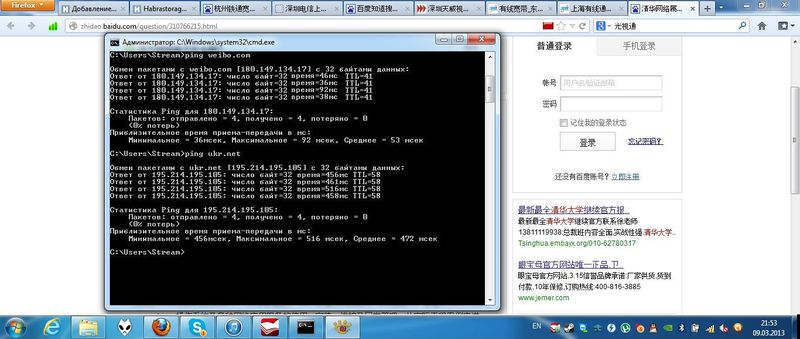
Internet Resources
So what can you do and what can you do in the Chinese segment of the Internet? Since this segment, in comparison with the world one, is extremely young, it is quite natural that the Chinesestole the borrowed creatively rethought the ideas of the world's leading services and brazenly copied adapted them to their needs. So, let's get started:
百度 -Baidu
One of the largest portals in China. Like any search engine that has accumulated a huge number of other services. Q&A, Maps, News, Image Search, Documents, etc. Indexes only Chinese and pages written in Latin. He brazenly ignores the Cyrillic alphabet, and when we try to find the Vkontakte website, we see such a ranking.
In general, all this is sad. In universities at the linguistic faculties to learn a certain language, you need to score a certain number of points in final exams. The required number of points depends on the importance of the language for China and the demand for translators. Most points are required for English and Japanese (the main international language and one of the main trading partners). For the Russian language specialty, the lowest passing score is good that it is at least non-zero ...
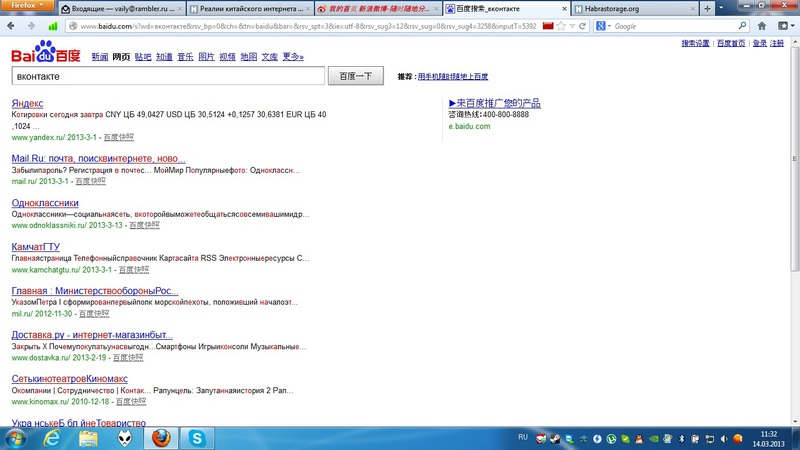
QQ
QQ is the undisputed leader in the segment of Internet instant messengers. Something between ICQ, Skype and Jabber. Also includes a social network QQ 空间 , mail QQ 邮箱, many online toys that are tightly integrated with the messenger. Standard features - chat, group chat, audio-video calls, sending files. There are clients for all popular platforms (iOS, Android, Linux, MacOS)
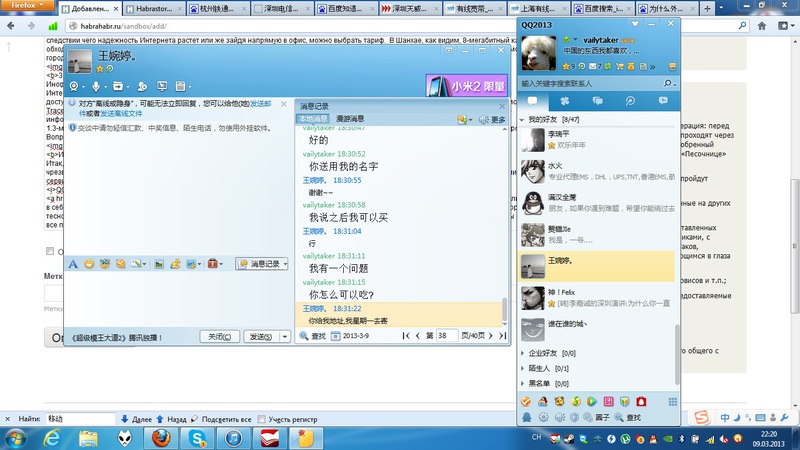
新浪 微 博 - Sina Weibo
Twitter analog. There is even nothing to describe. Notes up to 140 characters, hashtags, followers, verified star accounts. Everything is as usual.

支付 宝 - Alipay
The main and, in fact, the only system of Internet payments in mainland China. Naturally, no currencies other than the renminbi (it is generally forbidden to exchange the renminbi for foreign currency and issue international payment cards without a written notice confirming what you want to spend this money on and where. If a girl travels to America under the Work & Travel program, then on the basis of confirmation the receiving party, the directions from the organization in China, they draw up a payment card and exchange a certain amount for US dollars.
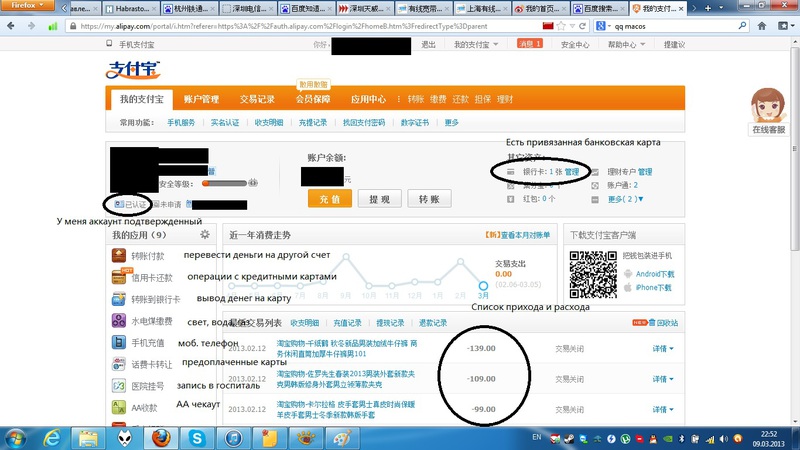
Here you can not mention Chinese Internet banking. This is something specific.
Since 99% of payment cards are and the hands of the Chinese are 银联 卡 ( UnionPay), then this determines the specifics of payments on the Internet. Payment by card number is possible only if it is credit (信用卡). I, like most Chinese, have a debit (savings card) - 龙 通 卡 (储蓄 卡). Therefore, payments on the Internet are possible only through online banking - like Privat24, etc. That is, the payment system (Alipay) gives you the amount, transfers it to the bank’s website, you log in, confirm all this with your password and the password of the USB key (or via SMS) and voila.
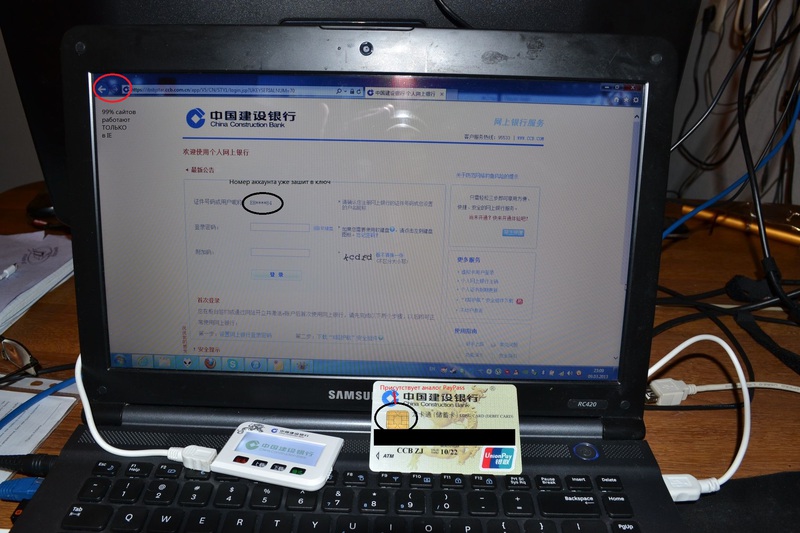
Only in China, your iTunes account must be replenished by the required amount. You can also bind a card, but you must have one to do this. What is it for a Chinese to receive an international payment card - see above.
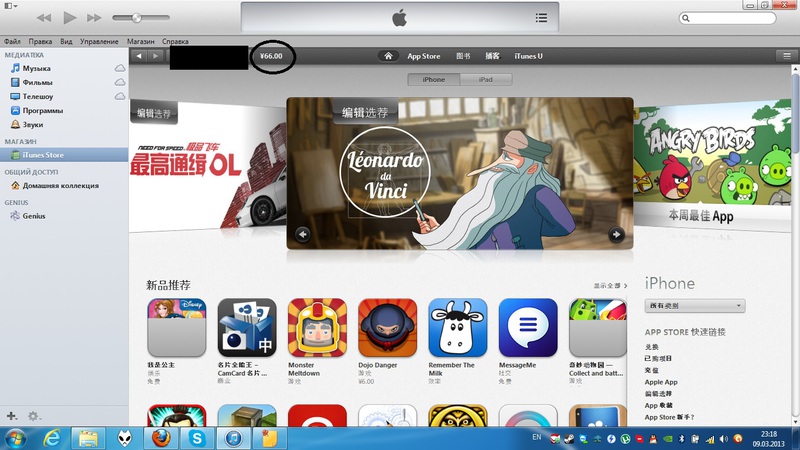
淘宝网 (Taobao)
I do not think I need a presentation. Part of the huge holding 阿里巴巴 (Alibaba), which includes the well-known Aliexpress and a bunch of small sites. Prices, compared with Aliexpress or DealExtreme - 30-40 percent lower. Taobao is not just an online auction, it is a huge system, combined with Alipay, on which you can buy everything from socks to cars and yachts. 90% of my clothes, equipment, etc. bought there.
And so on ...
金盾 工程 Golden shield
Great Chinese firewall. They came to its creation with all responsibility. If at the time of launch in 2003 there were a little more than a lot of holes in it, now it is practically an impenetrable barrier. All packets that have certain words in their headers are blocked. Certain domains containing certain words are blocked. I’m not a professional, I’m just learning, but from everything that I tried, nothing works. I tried everything - proxies, VPNs, Tor , i2p, paid and free anonymizers, etc. etc. The only thing that somehow works is the anonymizers. But entering my usernames and passwords on an incomprehensible website is not for me. Tightly blocked (including their frames) Youtube, Twitter, Facebook. Porn resources do not work. Separate Wikipedia pages are blocked. In combination with that providers in the country once or twice got too small, this creates an insurmountable barrier for the Chinese, thirsting for knowledge and makes it easy to control the seemingly uncontrolled Internet. The same goes for international payment cards. On internal 银联-cards on the Internet you can pay only on Alipay (Tenpay), which is easily controlled. When using international cards, processing can be from any bank, including from an international one, from where you can’t immediately scratch the information about who bought what and where. Therefore, get international. payment card (as I wrote) for the average Chinese is 99% impossible. True, anyone can go to Hong Kong or Macau, download everything he needs (get Visa Instant), and return. thirsty for knowledge and makes it easy to control the seemingly uncontrolled Internet. The same goes for international payment cards. On internal 银联-cards on the Internet you can pay only on Alipay (Tenpay), which is easily controlled. When using international cards, processing can be from any bank, including from an international one, from where you can’t immediately scratch the information about who bought what and where. Therefore, get international. payment card (as I wrote) for the average Chinese is 99% impossible. True, anyone can go to Hong Kong or Macau, download everything he needs (get Visa Instant), and return. thirsty for knowledge and makes it easy to control the seemingly uncontrolled Internet. The same goes for international payment cards. On internal 银联-cards on the Internet you can pay only on Alipay (Tenpay), which is easily controlled. When using international cards, processing can be from any bank, including from an international one, from where you can’t immediately scratch the information about who bought what and where. Therefore, get international. payment card (as I wrote) for the average Chinese is 99% impossible. True, anyone can go to Hong Kong or Macau, download everything he needs (get Visa Instant), and return. which is easily controlled. When using international cards, processing can be from any bank, including from an international one, from where you can’t immediately scratch the information about who bought what and where. Therefore, get international. payment card (as I wrote) for the average Chinese is 99% impossible. True, anyone can go to Hong Kong or Macau, download everything he needs (get Visa Instant), and return. which is easily controlled. When using international cards, processing can be from any bank, including from an international one, from where you can’t immediately scratch the information about who bought what and where. Therefore, get international. payment card (as I wrote) for the average Chinese is 99% impossible. True, anyone can go to Hong Kong or Macau, download everything he needs (get Visa Instant), and return.
IPTV
All Internet service providers provide this service. In the remote village 大有, in which 900 people, and in which I lived for two weeks, it is present. Price, depending on the number of channels - from 20 to 40 yuan per month. Everything is standard, as you yourself see in the picture - movies, broadcasting channels, karaoke, news, games, etc.

PS 1 yuan renminbi = 16 cents = 4.95 rubles.
Thank you for your attention, and special thanks to tavel for the invite. I hope you enjoy it, and in the future I will again delight you with reviews of local IT realities (I have more than enough information about which I have accumulated).

Connection, speeds and cost
Naturally, there will be no Internet without a physical connection to it. Let's look at how you can connect to the Internet while living in China.
In total, there are three providers in China. Naturally, they are all state-owned. Of course, there are a lot of small firms involved in connecting, configuring, sometimes even posing as providers, but they all use the infrastructure and technologies of the monsters listed below. Особ 有线 (Oriental Cable Network), which operates only in Shanghai and does not apply to the whole country, 清华大学 网络 (Tsinghua University Network), which houses the Cisco systems research center and a few exceptions, is a little apart. We will not consider them.
1) 中国 电信(China Telecom) ;
2) 中国 铁通 (China Railcom, already owned by 中国 移动(China Mobile) );
3) 中国 网通 (Chinanetcom, already owned by 中国 联通(China Unicom) ).
In 99% of cases, your Internet connection will be carried out using ADSL technology (if you do not live on a student campus, hostel or something similar). Internet prices in all price lists are indicated here for the year. I did not find a tariff with a speed above 8 Mbit / s.
Having found some kind of service company (the advantage of which is that it uses the backbone channels of two or more monsters, as a result of which the reliability of the Internet is growing or by going directly to the office, you can choose a tariff. In Shanghai, as you can see, an 8-megabyte channel costs 80 yuan per month, in Zhangjiang, for example, the fee for a 5-megabit channel is 90 yuan per month. The spread of prices depending on the city is 5-10%

Mobile
The number of mobile operators is the same as the number of wired Internet operators. All the same, China Mobile, China Unicom and China Telecom 、 All three companies are state-owned. The level of service, tariffs and speeds practically do not differ, the only significant difference is in the standards used. Let's take a closer look at them. By the way, not a single operator has prepaid tariff plans, once a month a certain amount will be unambiguously written off. When buying a SIM card, they almost never require a passport (or rather, the Chinese do not have passports, but ... In general, Shenfenzhen does not require either). Exceptions are special tariff plans (student, retirement, for the execution of a contract for which an appropriate document is required. In general, their passport system is based on NFC (which is built into all Shenzhen’s second generation), the lion's share of all the information is stored in it, but this is a topic for a separate post. If there are those who wish, I will issue it.
Lyrical digression. This section will use large numbers. It goes without saying that I translate all the numbers in the usual manner of numbering (not a system, it is there, like ours, decimal). But in China itself, the numbers operated are increasing in the following order. 1, 10, 100, 1000, 10000, 100000000. 10000 is written with the hieroglyph 万 [wàn] , 100000000 - with the hieroglyph 亿 [yì]. That is, if the Chinese need to say “million,” he will say “100 van”, if “billion” - “10 and”). That is, the population of Russia (143,369,806) is one “and”, 4,336 “van” 9806.
中国 移动 (China Mobile) )
The largest mobile and wireline operator in the world. 703 million subscribers. Subsidiaries in Hong Kong and Pakistan. The entire range of telecommunications services - from a landline telephone to mobile Internet. Standards used:
1) 2G - familiar to all GSM and EDGE.
2) 3G - TD-SCDMA. A purely Chinese standard, which all phone manufacturers for the domestic market are guided by.
3) 4G - TD-LTE. From the same opera. Well, with so many subscribers, you can lobby your standards.

As you can see, the tariff plans start at 58 yuan per month, for which 150 minutes of calls within the country and 30 megabytes of Internet are provided. For 10 yuan, you can buy yourself 150 SMS-s, and for 100 yuan - 2 gigabytes of Internet (for example, different packages are available).
中国 联通 (China Unicom))
Favorite operator laovaev, due to the fact that it uses the familiar HSPA standard. This is my choice, so I can tell you more about this operator.
140 million subscribers, the second largest operator in China. Standards used:
1) 2G - familiar to all GSM and EDGE.
2) 3G - again, familiar to all HSDPA up to 21 Mbps and HSUPA up to 7.2 Mbps
Due to the fact that 90% of the Chinese population is concentrated on 40% of the territory (these are coastal provinces from Hebei to Hainan), this region is ahead in terms of infrastructure (mobile communications, Internet, high-speed trains, airports, expressways, etc.) planets all over. Accordingly, 3G connection is everywhere. Standard Speedtest gives 5 Mbps during the day, up to 15-16 Mbps at night. Pings to domestic resources do not exceed 20-30 ms. Domestic roaming is present, but this is not shown in the prices (in domestic roaming, tariffs are 5-10% higher, I never saved traffic and calls during trips, and expenses were within the average monthly rate), but in maintenance. For example, a starter pack issued in one province cannot be replenished in another through payment terminals or through storerooms. Well, and so on. True, With the level of development of Internet banking, the balance of a mobile phone can be replenished using a client bank on the phone itself. So there isn’t much difference. There is a personal account in which you can track everything related to your account.

As you can see, the tariffs here are already more expensive. But the Internet is not always worth believing, and in local stores you can find cluttered starter packs, the prices of which will be several times lower. But this must be sought. And so, for 66 yuan per month, you get 50 minutes, 300 megabytes and 240 SMS. My starter pack, which was dug up in an almost abandoned store by good luck, includes a gigabyte of traffic per month for 50 yuan (and about 300 minutes and 200 sms per month).
中国 电信 (China Telecom)
And this is already good old CDMA. I can’t say almost anything about him, since I practically never met people using him. 129 million subscribers. Examples of tariffs:

As you can see, for 89 yuan per month we get calls at 1.6 mao (1 yuan = 10 mao) per minute and 100 megabytes of Internet. For 100 yuan, you can additionally buy 2 GB of Internet.
In general, there is a choice, there is competition, etc. You can always find something suitable.
Pings go gloomy abroad.
Sometimes they don’t reach at all ...
Internet surfing on Chinese resources goes smoothly and without any complications. The average ping is 50-60 ms. But attempts to reach foreign resources often turn into torture. The average ping to Ukrainian, Russian resources is 500-600 ms. Traceroute shows that up to most Runet resources (Vkontakte, Yandex, Habr), traffic goes through Sprint, that is, through America. According to information for 2010, the throughput of China's Internet backbones to the outside world is 50 Gb / s, which is extremely small for a country with a 1.3 billion population ... (Source - 百度 知道 -something like Google Q&A) And in the evenings, attempts to open some kind of external site turn into a torment of the F5 button.

Internet Resources
So what can you do and what can you do in the Chinese segment of the Internet? Since this segment, in comparison with the world one, is extremely young, it is quite natural that the Chinese
百度 -Baidu
One of the largest portals in China. Like any search engine that has accumulated a huge number of other services. Q&A, Maps, News, Image Search, Documents, etc. Indexes only Chinese and pages written in Latin. He brazenly ignores the Cyrillic alphabet, and when we try to find the Vkontakte website, we see such a ranking.
In general, all this is sad. In universities at the linguistic faculties to learn a certain language, you need to score a certain number of points in final exams. The required number of points depends on the importance of the language for China and the demand for translators. Most points are required for English and Japanese (the main international language and one of the main trading partners). For the Russian language specialty, the lowest passing score is good that it is at least non-zero ...

QQ is the undisputed leader in the segment of Internet instant messengers. Something between ICQ, Skype and Jabber. Also includes a social network QQ 空间 , mail QQ 邮箱, many online toys that are tightly integrated with the messenger. Standard features - chat, group chat, audio-video calls, sending files. There are clients for all popular platforms (iOS, Android, Linux, MacOS)

新浪 微 博 - Sina Weibo
Twitter analog. There is even nothing to describe. Notes up to 140 characters, hashtags, followers, verified star accounts. Everything is as usual.

支付 宝 - Alipay
The main and, in fact, the only system of Internet payments in mainland China. Naturally, no currencies other than the renminbi (it is generally forbidden to exchange the renminbi for foreign currency and issue international payment cards without a written notice confirming what you want to spend this money on and where. If a girl travels to America under the Work & Travel program, then on the basis of confirmation the receiving party, the directions from the organization in China, they draw up a payment card and exchange a certain amount for US dollars.

Here you can not mention Chinese Internet banking. This is something specific.
Since 99% of payment cards are and the hands of the Chinese are 银联 卡 ( UnionPay), then this determines the specifics of payments on the Internet. Payment by card number is possible only if it is credit (信用卡). I, like most Chinese, have a debit (savings card) - 龙 通 卡 (储蓄 卡). Therefore, payments on the Internet are possible only through online banking - like Privat24, etc. That is, the payment system (Alipay) gives you the amount, transfers it to the bank’s website, you log in, confirm all this with your password and the password of the USB key (or via SMS) and voila.

Only in China, your iTunes account must be replenished by the required amount. You can also bind a card, but you must have one to do this. What is it for a Chinese to receive an international payment card - see above.

淘宝网 (Taobao)
I do not think I need a presentation. Part of the huge holding 阿里巴巴 (Alibaba), which includes the well-known Aliexpress and a bunch of small sites. Prices, compared with Aliexpress or DealExtreme - 30-40 percent lower. Taobao is not just an online auction, it is a huge system, combined with Alipay, on which you can buy everything from socks to cars and yachts. 90% of my clothes, equipment, etc. bought there.
And so on ...
金盾 工程 Golden shield
Great Chinese firewall. They came to its creation with all responsibility. If at the time of launch in 2003 there were a little more than a lot of holes in it, now it is practically an impenetrable barrier. All packets that have certain words in their headers are blocked. Certain domains containing certain words are blocked. I’m not a professional, I’m just learning, but from everything that I tried, nothing works. I tried everything - proxies, VPNs, Tor , i2p, paid and free anonymizers, etc. etc. The only thing that somehow works is the anonymizers. But entering my usernames and passwords on an incomprehensible website is not for me. Tightly blocked (including their frames) Youtube, Twitter, Facebook. Porn resources do not work. Separate Wikipedia pages are blocked. In combination with that providers in the country once or twice got too small, this creates an insurmountable barrier for the Chinese, thirsting for knowledge and makes it easy to control the seemingly uncontrolled Internet. The same goes for international payment cards. On internal 银联-cards on the Internet you can pay only on Alipay (Tenpay), which is easily controlled. When using international cards, processing can be from any bank, including from an international one, from where you can’t immediately scratch the information about who bought what and where. Therefore, get international. payment card (as I wrote) for the average Chinese is 99% impossible. True, anyone can go to Hong Kong or Macau, download everything he needs (get Visa Instant), and return. thirsty for knowledge and makes it easy to control the seemingly uncontrolled Internet. The same goes for international payment cards. On internal 银联-cards on the Internet you can pay only on Alipay (Tenpay), which is easily controlled. When using international cards, processing can be from any bank, including from an international one, from where you can’t immediately scratch the information about who bought what and where. Therefore, get international. payment card (as I wrote) for the average Chinese is 99% impossible. True, anyone can go to Hong Kong or Macau, download everything he needs (get Visa Instant), and return. thirsty for knowledge and makes it easy to control the seemingly uncontrolled Internet. The same goes for international payment cards. On internal 银联-cards on the Internet you can pay only on Alipay (Tenpay), which is easily controlled. When using international cards, processing can be from any bank, including from an international one, from where you can’t immediately scratch the information about who bought what and where. Therefore, get international. payment card (as I wrote) for the average Chinese is 99% impossible. True, anyone can go to Hong Kong or Macau, download everything he needs (get Visa Instant), and return. which is easily controlled. When using international cards, processing can be from any bank, including from an international one, from where you can’t immediately scratch the information about who bought what and where. Therefore, get international. payment card (as I wrote) for the average Chinese is 99% impossible. True, anyone can go to Hong Kong or Macau, download everything he needs (get Visa Instant), and return. which is easily controlled. When using international cards, processing can be from any bank, including from an international one, from where you can’t immediately scratch the information about who bought what and where. Therefore, get international. payment card (as I wrote) for the average Chinese is 99% impossible. True, anyone can go to Hong Kong or Macau, download everything he needs (get Visa Instant), and return.
IPTV
All Internet service providers provide this service. In the remote village 大有, in which 900 people, and in which I lived for two weeks, it is present. Price, depending on the number of channels - from 20 to 40 yuan per month. Everything is standard, as you yourself see in the picture - movies, broadcasting channels, karaoke, news, games, etc.

PS 1 yuan renminbi = 16 cents = 4.95 rubles.
Thank you for your attention, and special thanks to tavel for the invite. I hope you enjoy it, and in the future I will again delight you with reviews of local IT realities (I have more than enough information about which I have accumulated).
